- Home
- Alex Archer
Staff of Judea Page 2
Staff of Judea Read online
Page 2
“Mr. Cummings, you indicated that your client is not interested in paying anywhere near what my client is asking. That is, of course, your right. As a result, I am exercising my right to end these negotiations. I came here in good faith to sell this artifact. You, apparently, came here to waste everyone’s time. I don’t believe we have anything more to discuss. Good day, gentlemen.”
Chew on that, you bloated toad.
No one said anything as she finished putting her files in the slim leather briefcase Roux had given her that morning and stepped away from the table. She headed for the door of the hotel’s conference room, counting silently in her head.
One one thousand, two one thousand, three one thousand…
Behind her, a phone rang.
Gotcha!
“A moment, please, Miss Creed.” She turned to find Finch watching her, the still-ringing cell phone in his hand.
Interesting. Perhaps Finch is more of a senior player than I thought. Annja waved him to answer the call.
Finch did so, listening to whoever was on the other end of the line—Connolly most likely. After saying a few words too quietly for Annja to hear, he hung up.
He turned to face her. “Please forgive my colleague, Ms. Creed. In his excitement to do his job, it appears he misspoke.”
Annja raised an eyebrow. “Is that so?”
“Perhaps you’d be willing to return to the table so we can discuss this further?”
Cummings looked like he’d swallowed half a dozen lemons, which delighted her to no end, and she took a perverse pleasure in returning to the table and facing Finch rather than his portly partner.
“Mr. Connolly says he is willing to offer three and a half million in cash, as well as a fourteenth-century codex written by the blind monk Justinian in exchange for the ossuary. What do you say to that?”
Annja pretended to give the matter some thought, but already knew she was going to accept the offer. Roux would be lucky to get two million if he offered the ossuary on the open market, so anything over that was pure gravy. With an extra 1.5 million in cash and the codex thrown in, it was a deal she couldn’t refuse.
After a few moments she pretended to come to a decision, smiled a shark’s smile across the table at her opponent and said, “I’d say we have a deal, Mr. Finch.”
* * *
AN HOUR LATER Annja was sitting in a chaise longue on the balcony of Roux’s suite in the David Citadel Hotel. Jerusalem’s Old City splayed out before her, the white walls washed bloodred in the setting sun. Roux was seated beside her in the twin to her lounge. He was dressed in light cotton trousers and an open-necked shirt. Comfortable lounging clothes, as he liked to call them.
Annja never would have guessed how her life would change upon meeting Roux. Nor, she imagined, would he. They had first encountered each other in the foothills of France where Annja had been hunting for information on the legendary Beast of Gevaudan. An irate crime boss out for revenge and an earthquake had thrown the two of them together unexpectedly. The quake had opened the earth under Annja’s feet, dragging her into a sinkhole connected to a series of caverns. In the caverns she’d found an irregularly shaped coin hanging on a leather thong around the neck of the man who had died killing the beast’s savagery.
The “coin” had turned out to be the last missing piece to the blade of a sword that had once belonged to Joan of Arc. Roux had been there the day the young woman he had sworn to protect, Joan herself, burned in a heretic’s fire. He had watched as the sword she had carried had been broken beneath the boot heel of an English captain. The death of the bearer and the sundering of the blade had sparked some kind of mystical working on both Roux and his squire, Garin Braden. It wasn’t long after that the two men had discovered their lives had been indefinitely extended. As a result, they had individually begun a search for the pieces of the blade—Roux under the belief that bringing them back together might release him from the weapon’s curse, while Braden sought to safeguard his longevity by keeping them out of his former master’s hands. The situation had put them on opposing sides for several centuries, until Roux had finally succeeded in bringing all of the pieces of the sword back together again in Annja’s presence. To their surprise, the weapon had been mystically forged anew and had become bound to Annja in a fashion no one, not even Roux, had ever imagined.
Thinking of the sword brought a smile to Annja’s lips. She could still remember Roux’s shock when the blade had reformed right before their eyes. Roux wasn’t surprised very often, she’d learned since, but he certainly had been then.
“Is that smile for your victory or the sizable commission you’ll be getting as a result?” Roux asked.
“Neither, actually. Just enjoying the day.”
“Bah! When you get to my age, they all tend to blend together. But the thrill of besting your adversary never gets old!”
Annja laughed. If there was one constant with Roux, it was that he loved besting anyone he saw as his competition.
“What’s on the agenda now that you’ve milked Connolly out of an extra million?”
“I’m off to Monte Carlo first thing in the morning,” Roux answered with a gleam in his eye. “There’s a Texas Hold’em tournament beginning tomorrow night that I have every intention of winning. Care to join me?”
She was tempted. Time spent with Roux was always an education of one sort or another. The man had lived for over five hundred years and had seen some of the most amazing changes in human history. She even had money to spare for a change. But it had been some time since she’d last visited Jerusalem and she felt the pull of the Old City.
“I think I’ll stay here for a few days,” she told him, “take in some of the sights.”
There was something here for her in the Old City. She didn’t know what yet, but she would soon enough. She’d learned to trust her instincts since taking up the sword and right now every fiber in her being was telling her that she was needed here.
Chapter 3
After breakfast the next morning, Annja decided to begin her sightseeing expedition by looking at some old books. Two-thousand-year-old books, to be precise. A taxi brought her to the Givat Ram neighborhood in central Jerusalem where many of Israel’s important national institutions were located, including the Knesset, the Israeli Supreme Court, the National Library of Israel and the Israeli Museum.
She was headed to the latter, specifically the wing of the museum known as the Shrine of the Book. Built in 1965, the shrine was home to several major archaeological finds, including the Aleppo Codex and the Dead Sea Scrolls. While any of the exhibits would likely have held her interest on any given day, Annja had specifically come to see a showing of the Copper Scroll currently on loan from the Jordanian Museum. The scroll was only rarely on display and Annja was determined to see it while she had the chance.
After all, it isn’t every day you get to see a two-thousand-year-old treasure map!
The shrine’s architectural design was unusual. Two-thirds of the main structure was underground with the remainder topped by a large white dome reflected in the pool of water that surrounded it. Across from the dome was a black basalt wall. The colors and shapes of the building had been deliberately chosen to suggest the imagery of the War Between the Sons of Light and the Sons of Darkness—the white symbolized the light and the black the darkness. The images came from the scroll, one of those many found in the caves at Qumran and which eventually had become known the world over as the Dead Sea Scrolls. It detailed a battle between the forces of good and the forces of evil. Since taking up the sword, Annja herself had become a living symbol of the struggle between good and evil and she found herself musing over that particular irony as she gazed at the glistening white surface of the dome.
The Dead Sea Scrolls were a collection of over nine hundred biblical texts and other manuscripts that had
been discovered in a series of caves in the Qumran wadi between 1947 and 1956. Written on parchment, papyrus and, in the case of the unique scroll she had come to see today, copper. They were some of the oldest surviving copies of certain books from the Hebrew Bible and as such had tremendous historical and religious significance. They were generally divided into three groups—biblical manuscripts, apocryphal or noncanonized biblical texts and sectarian manuscripts. Both the War Scroll and the Copper Scroll were considered sectarian.
Since the fragility of the scrolls made it impossible to keep them on display, various copies were rotated into the display cases housed in the underground portion of the building. Annja descended the stairs to the main floor and began moving through the exhibition, slipping past small groups of tourists. At first she stopped occasionally to examine one display or another, but her impatience finally got the better of her and she moved directly toward the last exhibit, the one featuring the unique scroll she came here to see.
The Copper Scroll.
Besides the fact that it was the only one that had been written on a sheet of metal, what made the scroll so different from the others found at Qumran was that it was not a literary work, but rather a list of sixty-four locations where various items of silver and gold had supposedly been hidden. And not just a few coins here and there, Annja mused, but treasure measured in tons. Back in 1960 the entire haul had been estimated to be worth more than one million U.S., which, she knew, meant it was worth one heck of a lot more now.
So far no one had been able to find any of the various troves listed on the scroll, for the starting point referenced in the directions had either been deliberately obscured or simply lost in the centuries since the scrolls had been written. And that, of course, was what made it so intriguing to Annja. The scroll was a giant puzzle just waiting for someone like her to solve.
One thing was for certain, whoever solved it was going to be set for life, if the amount of the treasure listed on the scroll turned out to be accurate.
Annja turned a corner and there at last was the scroll. It had originally been discovered as two separate scrolls written on rolled sheets of copper, but the metal had been too corroded to be unrolled without damaging them so they had been cut lengthwise into twenty-three separate sheets. Several of those sheets hung in the cases before her and she spent some time examining them, marveling at the technology that allowed a voice from the past to travel so far into the future. It was discoveries like this that had prompted her to become an archaeologist and she still found, all these years later, that it was the first true love of her life.
An English translation of the scroll hung on the wall next to the display case. She read the first few lines of the first column.
In the ruin that is in the valley of Acor, under the steps, with the entrance at the East, a distance of forty cubits: a strongbox of silver and its vessels, with a weight of seventeen talents.
Each verse of the scroll held to the same basic formula: general location, specific location and listing of what would be found there.
She looked over at the second column.
In the salt pit that is under the steps: forty-one talents of silver. In the cave of the old washer’s chamber, on the third terrace: sixty-five ingots of gold.
Annja knew that a talent was estimated to be about equal to something between fifty and seventy-five pounds, so a single talent worth of gold at today’s market prices was worth something in the neighborhood of $800,000. Which means that first verse alone is worth a small fortune to whoever finds it, she thought. And there are sixty-three more locations!
That was a lot of money.
Of course, finding it was the trick. That second verse was a prime example of the problems would-be treasure hunters had with the document. You were supposed to find the salt pit under the steps, but the document didn’t give any sense of what building those steps were in. The same held true for the old washer’s chamber mentioned a few lines later. It was worse than trying to find a needle in a haystack, because first you had to find the correct haystack!
It made an intriguing puzzle, there was no doubt about that.
Annja was about to move on to the next display when a reflection in the glass of the case next to her caught her eye. She saw a man leaning around the edge of the doorway behind her, a camera in his hand. Normally Annja wouldn’t have given it a second thought. They were in a museum and people took pictures in museums. But she was standing squarely in front of the display case, blocking the camera’s view of the scroll, which meant the guy was either a completely incompetent photographer or he was taking a picture of her.
Annja relished her privacy, perhaps more than most given the unusual nature of the activities she’d become involved in since taking up the sword and the cause that came with it, and she didn’t take kindly to having it violated.
She spun around, intending to have a word with her newfound admirer, only to find the words sticking unspoken in her throat when she discovered the newcomer was now holding a gun rather than a camera.
A gun that was pointing directly at her.
Chapter 4
Fifteen feet.
That was all that separated Annja from the gunman, but it might as well have been fifty. By the time she called her sword and crossed that short distance, the man with the gun would have been able to pull the trigger two, maybe even three times.
I’m quick, but not that quick.
The average person off the street would have been frozen with fear at having a gun pointed in their direction, but not Annja. Her work as bearer of Joan of Arc’s sword had brought her into contact with some very hard men and women over the past years, some of whom had appeared far more frightening than the slim, Arab-looking individual standing on the other side of the room, though Annja knew that looks could be deceiving. She would have to be careful, there was no doubt about that, but where another’s thoughts might have been mired in indecision by the sight of the gun, Annja was already calculating her options.
She was either going to have to close with him or escape in the opposite direction. Unfortunately, a quick glance showed her that the only door out of the gallery was on the other side of the room, behind the gunman.
Perhaps she could just yell for help?
He must have realized what she was thinking. “I will shoot if you yell, Ms. Creed,” he said, betraying British-accented English and the knowledge that he knew exactly who she was.
The first revelation was incidental—probably half the men his age spoke English with a British accent, given the long years that this part of the world had been under British rule. The second revelation was far more interesting. It told her he hadn’t come here to rob some random, unsuspecting tourist. He’d been looking specifically for her.
“If you shoot you’ll bring security running,” she told him, betting that discovery would be the last thing he wanted.
In reply, he twitched the gun to the left and pulled the trigger.
There was a soft, spitting sound and then Annja felt a breath of superheated air race across her cheek as the bullet sped past with only inches to spare. It made more noise thudding into the wall somewhere behind her than it did leaving the barrel of the gun.
“That may be the case, Ms. Creed,” the gunman said to her in response, “but you will be dead before they get here.”
Annja frowned. She hadn’t noticed the silencer on first glance and that wasn’t like her. She needed to pay better attention. Her life depended on it.
“What do you want?” she asked, keeping her voice down. A calm gunman was more likely to stay in control, she reasoned, and less likely to shoot the first tourist that happened to wander into their tête-à-tête.
Now if she could just get him to move closer….
“You are about to be offered a job. My colleagues and I would like to discuss w
hy it is not a good idea for you to accept the position. We’re going to walk out of here together, without making a fuss. A car will pick us up outside.”
“And if I choose not to cooperate?”
“Then I will step back into the gallery behind me and start shooting civilians until you change your mind. We intend to have a conversation, one way or another. It is up to you.”
He could have been commenting on the weather or some other banality rather than killing innocent people in cold blood. Hearing that tone was enough to convince her he was deadly serious.
He wasn’t giving her much of a choice, now was he?
“Lead on,” she said with what she hoped was a disarming smile.
He didn’t register the humor in her remark. He gestured for her to come toward him, stepping back out of the way as she drew closer, keeping himself out of her reach.
She couldn’t fault him for his caution. She did intend to go for his gun, just not in the way he expected. She made note of the waist-high display case directly behind him and smiled to herself at the way he’d unintentionally eliminated one direction of retreat.
He tensed as she drew abreast and then relaxed slightly as she passed. That was what she was waiting for, that moment when he thought the height of danger had passed.
Annja mentally reached into the otherwhere, that mystical place she’d been made aware of when she’d taken up Joan’s sword, and called the weapon to her. The ancient broadsword leaped into her hand as if it possessed an intelligence of its own. The hilt fitted her grip exactly and the weapon seemed perfectly balanced, as if it had been made for her and her alone.
As the sword flashed into existence, Annja spun to one side and lashed out with the weapon, aiming for the arm that was holding the handgun. She could have taken his hand off at the wrist, and probably should have, but something caused her to turn the blade at the last minute. Instead of slashing through flesh and bone, the flat of the blade caught the fingers of the hand holding the gun, knocking the weapon from the gunman’s grasp.

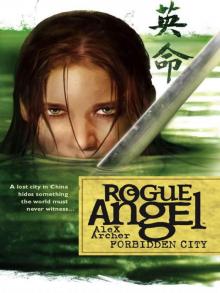 Rogue Angel: Forbidden City
Rogue Angel: Forbidden City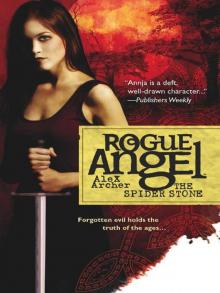 The Spider Stone
The Spider Stone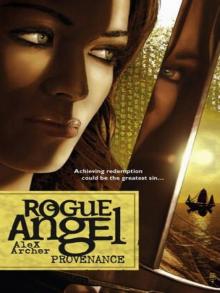 Provenance
Provenance Blood Cursed
Blood Cursed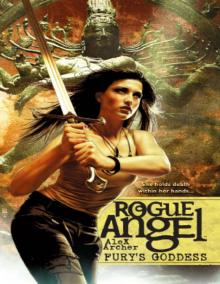 Fury's Goddess
Fury's Goddess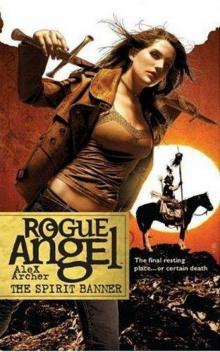 The Spirit Banner
The Spirit Banner Footprints
Footprints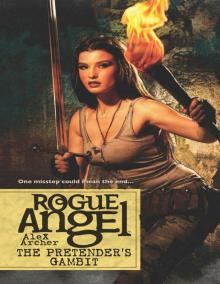 The Pretender's Gambit
The Pretender's Gambit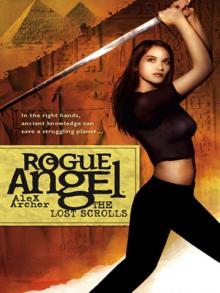 Rogue Angel: The Lost Scrolls
Rogue Angel: The Lost Scrolls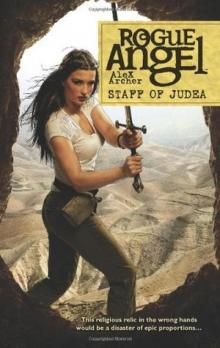 Staff of Judea
Staff of Judea Rogue Angel 55: Beneath Still Waters
Rogue Angel 55: Beneath Still Waters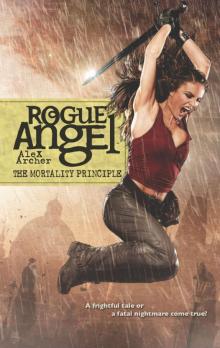 The Mortality Principle
The Mortality Principle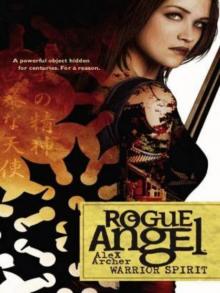 Warrior Spirit
Warrior Spirit Paradox
Paradox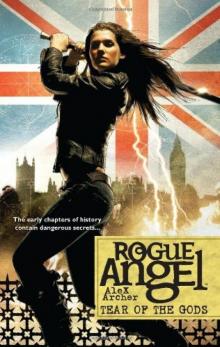 Tear of the Gods
Tear of the Gods Forbidden City
Forbidden City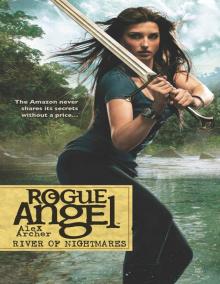 River of Nightmares (Rogue Angel)
River of Nightmares (Rogue Angel)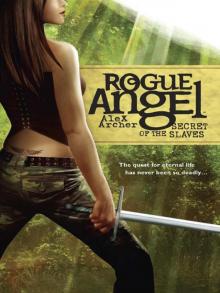 Rogue Angel: The Secret of the Slaves
Rogue Angel: The Secret of the Slaves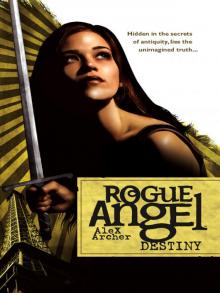 Destiny
Destiny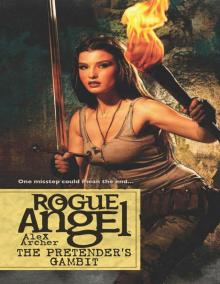 Rogue Angel 51: The Pretender's Gambit
Rogue Angel 51: The Pretender's Gambit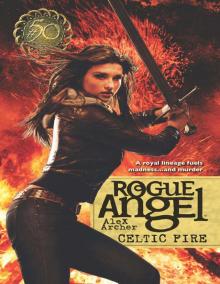 Celtic Fire
Celtic Fire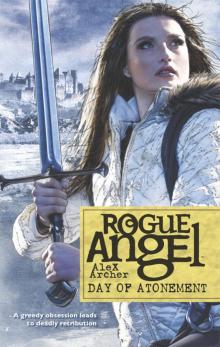 Rogue Angel 54: Day of Atonement
Rogue Angel 54: Day of Atonement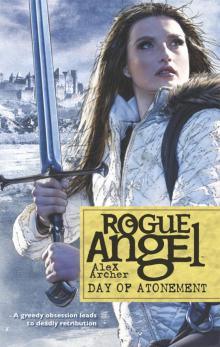 Day of Atonement
Day of Atonement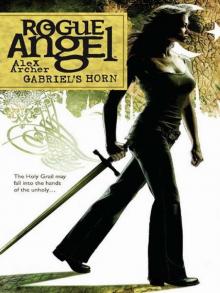 Rogue Angel: Gabriel's Horn
Rogue Angel: Gabriel's Horn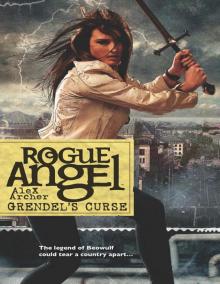 Grendel's Curse
Grendel's Curse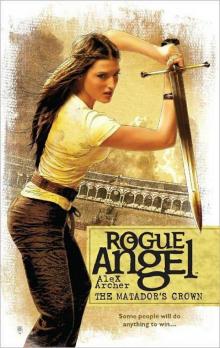 The Matador's Crown
The Matador's Crown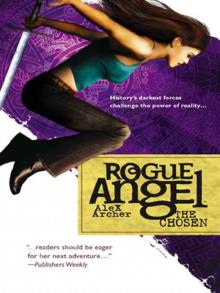 Rogue Angel: The Chosen
Rogue Angel: The Chosen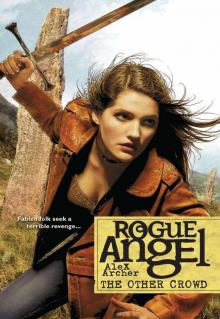 The Other Crowd
The Other Crowd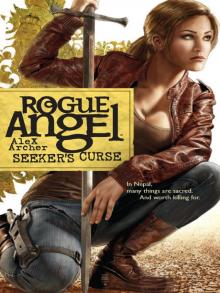 Seeker’s Curse
Seeker’s Curse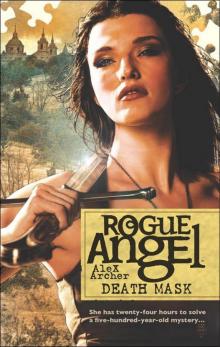 Rogue Angel 52: Death Mask
Rogue Angel 52: Death Mask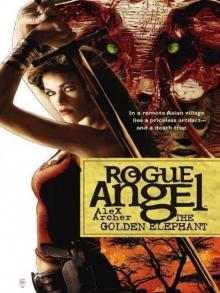 The Golden Elephant
The Golden Elephant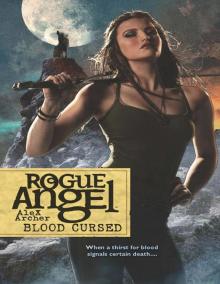 Blood Cursed (Rogue Angel)
Blood Cursed (Rogue Angel)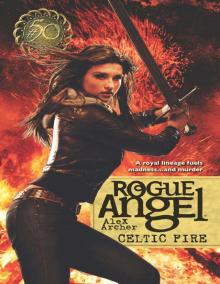 Celtic Fire (Rogue Angel)
Celtic Fire (Rogue Angel)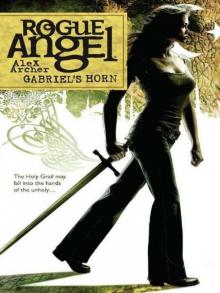 Gabriel's Horn
Gabriel's Horn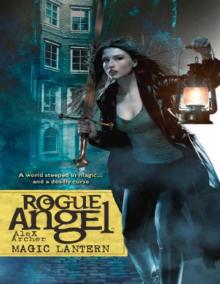 Magic Lantern (Rogue Angel)
Magic Lantern (Rogue Angel)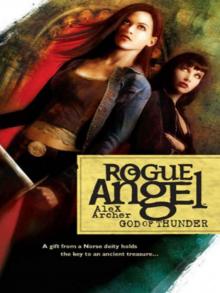 God of Thunder
God of Thunder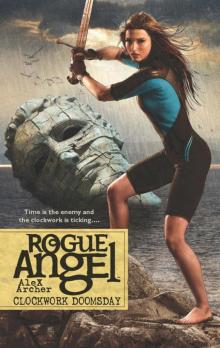 Clockwork Doomsday
Clockwork Doomsday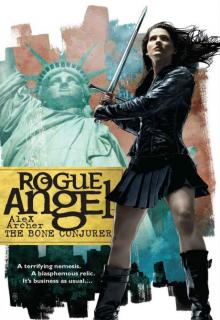 The Bone Conjurer
The Bone Conjurer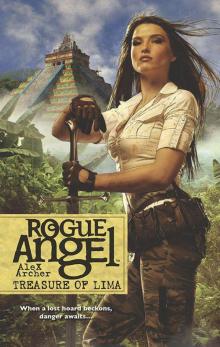 Treasure of Lima
Treasure of Lima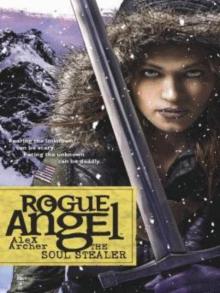 The Soul Stealer
The Soul Stealer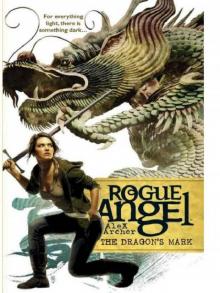 The Dragon’s Mark
The Dragon’s Mark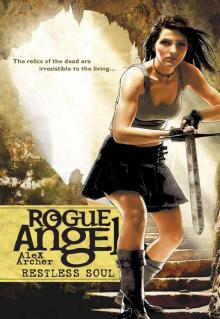 Restless Soul
Restless Soul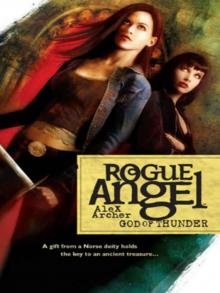 Rogue Angel: God Of Thunder
Rogue Angel: God Of Thunder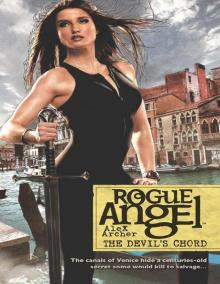 Rogue Angel 49: The Devil's Chord
Rogue Angel 49: The Devil's Chord Death Mask
Death Mask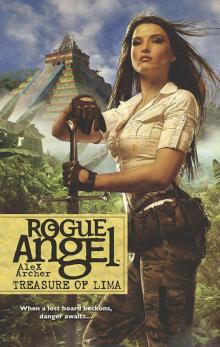 Rogue Angel 46: Treasure of Lima
Rogue Angel 46: Treasure of Lima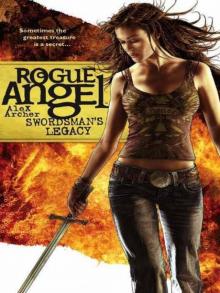 Swordsman's Legacy
Swordsman's Legacy The Oracle's Message
The Oracle's Message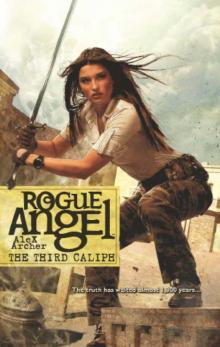 The Third Caliph
The Third Caliph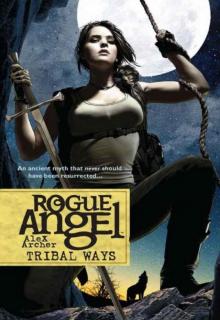 Tribal Ways
Tribal Ways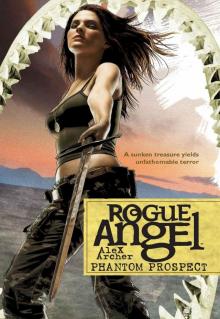 Phantom Prospect
Phantom Prospect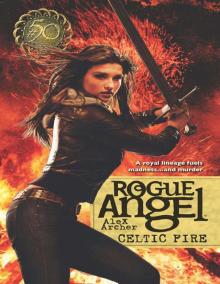 Rogue Angel 50: Celtic Fire
Rogue Angel 50: Celtic Fire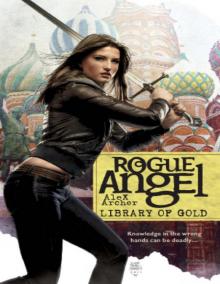 Library of Gold
Library of Gold Rogue Angel 53: Bathed in Blood
Rogue Angel 53: Bathed in Blood Sacred Ground
Sacred Ground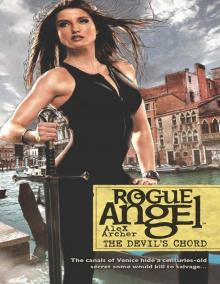 The Devil's Chord
The Devil's Chord Serpent's Kiss
Serpent's Kiss The Vanishing Tribe
The Vanishing Tribe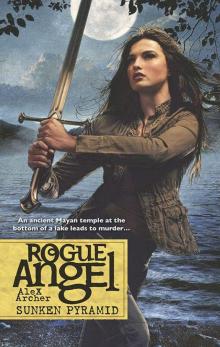 Sunken Pyramid
Sunken Pyramid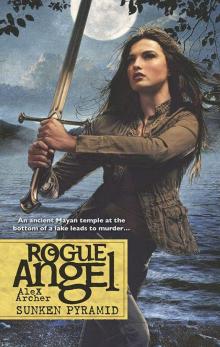 Sunken Pyramid (Rogue Angel)
Sunken Pyramid (Rogue Angel)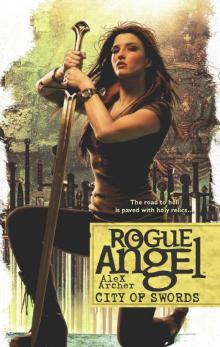 City of Swords
City of Swords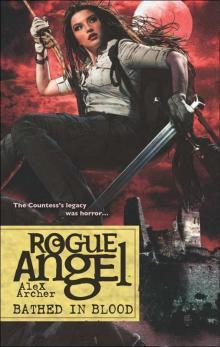 Bathed in Blood
Bathed in Blood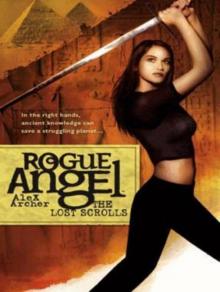 The Lost Scrolls
The Lost Scrolls The Babel Codex
The Babel Codex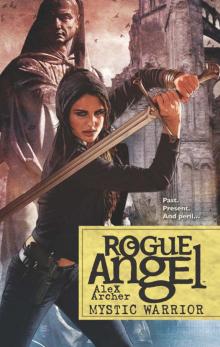 Mystic Warrior
Mystic Warrior Eternal Journey
Eternal Journey Beneath Still Waters
Beneath Still Waters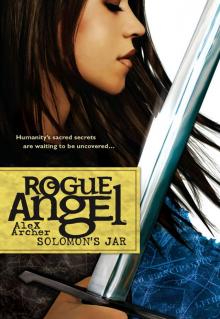 Solomon's Jar
Solomon's Jar Beneath Still Waters (Rogue Angel Book 55)
Beneath Still Waters (Rogue Angel Book 55) Cradle of Solitude
Cradle of Solitude Secret of the Slaves
Secret of the Slaves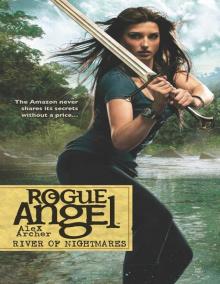 River of Nightmares
River of Nightmares Polar Quest
Polar Quest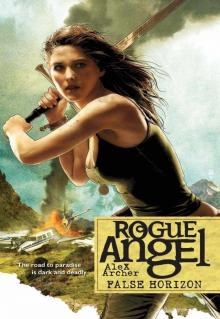 False Horizon
False Horizon